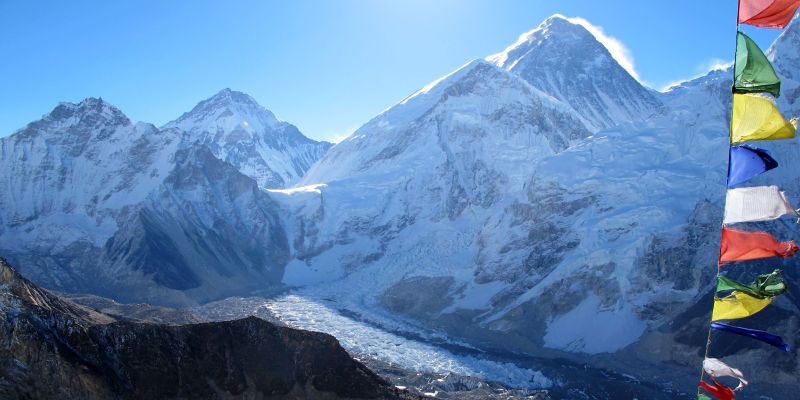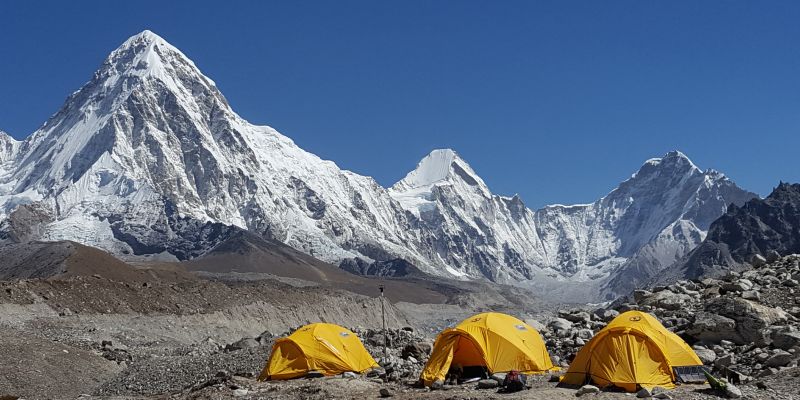
Climate change is hitting the hardest in the world’s mountain ranges. We learn how Leeds glaciologist Professor Duncan Quincey is helping locals at the world's highest glacier.
At 5,000m, the Khumbu glacier in Nepal is the highest in the world. It is at the base of Mount Everest, and that causes huge challenges for glaciologist, Professor Duncan Quincey.
Camping on the glacier, Duncan and the research team contend with harsh, dry conditions, dealing with the cold and altitude sickness: “You get around 50% of the work done compared to sea level conditions due to exhaustion. There’s also nowhere to wash except meltwater ponds, which are extremely cold – you certainly know about it when you get in there.”
But he has to be here, where climate change is hitting the hardest – and fastest. These iconic landscapes will soon be hard to recognise. “The glaciers are melting, that’s a fact,” said Professor Duncan Quincey. “What is important now is finding out how fast, and what that will mean for the landscape and the people.”
At an upcoming online Meet the Researchers event – ‘Treading on thin ice: a looming water crisis in the Third Pole’, on 29 March 2023, Professor Duncan Quincey will talk about his unique work on world's highest glacier in Nepal.

Whereas many research groups use satellite imagery to establish patterns within a general region, Duncan and his team work on individual systems and glaciers. They gather data from the glaciers themselves – most recently drilling into the ice to explore their interiors.
“We melted a 160m long borehole into the ice and sent our temperature sensors down there.
“The lowest temperature was just -3.3 degrees. That means it’s at the melting point, so in the next decade, it’s likely to be disappearing fast.”
A significant part of Duncan’s work aims to establish what this might mean for the landscape and the people of the region. As well as flooding events becoming more likely, the supply of water to local communities is a key issue.
“Millions of people depend on the water from the mountains – for irrigation, hydropower, sanitation – so if we can evaluate what the changes are, we can evaluate prospects for the next 40 to 50 years.”
Through workshops, household surveys and informal conversation, Duncan has established that it is the unpredictability of the changing system that causes most problems. “The supply of water is more variable than it used to be,” Duncan said. “The extremes are more common, and the whole system is less linear.
“People need to adapt. Our work is about giving them the best chance to do that.”
To learn more about Duncan’s work in Nepal, including plans to take an inflatable kayak across a glacial lake, sign up to the upcoming online Meet the Researchers event – ‘Treading on thin ice: a looming water crisis in the Third Pole’.
water@leeds: at the heart of global water research
Duncan is part of the water@leeds research group, a community of 200 researchers tackling major water problems in one of the largest interdisciplinary centres for water research in any university in the world.
The Meet the Reseachers event series tells the stories of the water@leeds researchers making a difference around the globe.
Meet the Researchers events
How do you research the global water crisis? Answer the big six questions!
8 March 2023 – Anna Mdee, Professor in the Politics of Global Development, School of Politics and International Studies
What are the big six global water questions? In 2022, Prof. Anna Mdee led a global survey to identify the top 100 global water research questions which were then distilled down to the big six. Join us to find out what they are and how Leeds is playing a part in providing answers.
Improving urban sanitation around the world
15 March 2023 – Dr. Paul Hutchings, Lecturer in Water, Sanitation and Health, School of Civil Engineering
Over four billion people use sanitation services that leave human waste untreated, significantly contributing to disease and environmental degradation. Sanitation services in unplanned, high-density urban settlements – often called slums – have the most harmful service deficiencies and a lack of solutions. Dr Paul Hutchings will unpack the causes of this global problem and provide an overview of research at Leeds that is trying to find solutions.
Restoring our peatlands: why does it make economic sense
22 March 2023 – Julia Martin-Ortega, Professor of Ecological Economics and Associate Director of water@leeds, School of Earth and Environment
Peatlands play a vital role in carbon capture; covering just over three per cent of the Earth’s surface, they store a third of the world’s soil carbon. However, following decades of degradation, the global peatland greenhouse gas balance is changing. Join us to discover how investing in peatland restoration sooner rather than later will avoid huge costs, generate benefits to society and ultimately address our climate emergency.
For further information
If you have any issues accessing the Meet the Researchers event series online form, please email the Alumni Events team on alumnievents@leeds.ac.uk to book your place on an event.